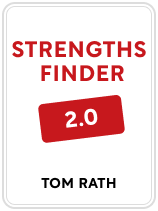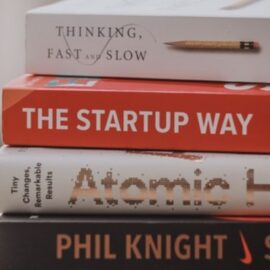

This article is an excerpt from the Shortform book guide to "StrengthsFinder 2.0" by Frederick Brooks. Shortform has the world's best summaries and analyses of books you should be reading.
Like this article? Sign up for a free trial here .
What are the StrengthsFinder strengths? How are they described? What are your top strengths?
In StrengthsFinder 2.0, Tom Rath describes the 34 innate abilities the StrengthsFinder test looks for. He also provides suggestions for capitalizing on your innate ability to achieve your greatest potential. Even if you read this book without taking the test, you’ll learn about the different strengths you might have and how to build upon them to find success. Alongside descriptions of the 34 innate abilities, we provide commentary on further ways to grow your ability, potential downsides to certain abilities, and situations in which everyone should try to improve an ability, not just those who already excel at it.
Here’s an exploration of each ability and suggestions on how to build upon them.
The 34 StrengthsFinder Strengths
What are the StrengthsFinder strengths? We’ve grouped them into four categories: action-oriented abilities, cognitive abilities, belief-based abilities, and people-oriented abilities. We cover most of these abilities individually within the categories, but we’ve also combined some of Rath’s abilities that are similar to each other (we’ve indicated clearly where we’ve done this). You’ll find Rath’s original ability name in parentheses, so you can compare our guide to your Strengths Test results, if applicable.
Action-Oriented Abilities
These nine abilities involve action or forward movement.
Ability #1: Doer (Achiever)
Rath writes that if you’re a doer (Achiever), you’re innately driven to accomplish goals. When you don’t accomplish a goal, you feel bad, and when you don’t have a goal, you find a new one to strive toward. An example of a doer is a runner who keeps entering longer and longer races to attain a feeling of accomplishment.
To capitalize on your doer abilities, give yourself benchmarks to measure your progress toward a goal. This will give a clear picture of what you’ve achieved so far (and what you still need to achieve) and will keep you motivated to reach the goal.
(Shortform note: If you need help setting concrete benchmarks to measure your progress toward a goal, consider the advice John Doerr gives in Measure What Matters to define key results. Key results are the three to five micro-goals you must hit on the way to achieving your larger goal. Collectively, your key results must be specific, measurable, and timebound, and completing them must result in you reaching your goal. For example, if your broader goal is to grow your business this year, your key results might be to hit a certain number of sales within a year, to generate a certain amount of revenue within a year, and to launch in one new region this year.)
Ability #2: Catalyst (Activator)
As a catalyst (Activator), you want to put plans into action right away, writes Rath. You dislike endlessly ironing out details and would rather try something and fail so that you can learn from the experience. For example, a catalyst teacher might test a new exercise in the classroom right away and see how it goes instead of tweaking it until it’s perfect.
To build your catalyst strength, consistently put yourself in challenging and potentially uncomfortable situations to keep learning and growing.
(Shortform note: Although catalysts learn through action, they may fail to learn—or learn the wrong lessons—if they don’t get good at accurately analyzing what went wrong in their failures. You can become a better analyst of your failure by digging deeply into the root of your error, rather than being content with a simple explanation. You might also benefit from the feedback of a group of friends and colleagues with varied strengths and specialties, who can call attention to problems with your approach you didn’t have the expertise to see.)
Ability #3: Leader (Command)
As a leader (Command), you take a firm stance on issues and communicate your opinion clearly and fearlessly, asserts Rath. You confront difficult situations head-on, which means others often see you as a leader. For instance, a leader political strategist wouldn’t hesitate to tell their candidate why their platform won’t win them the election.
To best use your leader ability, learn how to confront people in a way that’s not off-putting and will get them on your side effectively.
(Shortform note: Rath believes strong leadership is an innate ability only certain people possess. However, in Dare to Lead, Brené Brown argues not only that strong leadership can be learned, but also that developing strong leadership is essential for organizations to act innovatively and creatively. She writes that leaders can learn to communicate fearlessly and take stands by living in accordance with their values and forging trust within the organization. Rath’s recommendation to confront people in a constructive, amenable way could be considered a form of forging trust.)
Ability #4: Contender (Competition)
If you’re a contender (Competition), you’re motivated by the desire to win and beat others, though you’re not necessarily mean or unpleasant about it, claims Rath. Your sense of success is based on how well you do compared to others. For example, a contender salesperson is motivated to achieve by the desire to sell more than their colleague.
To grow your contender strength, compare yourself against others who are better than you. This will force you to strengthen your skills to beat them.
(Shortform note: Rath counsels you to compare yourself against your betters to grow but doesn’t provide specific ways to do this. In Can’t Hurt Me, David Goggins describes a more elaborate, formalized system to compare yourself against your betters and grow: First, identify the competition you want to win (for example, you want to give a better presentation at a conference than your peers). Second, identify the opponent you want to best (a friend from a competitor company, for instance). Third, choose a way to showcase your talent (for example, you might focus on telling a compelling story). Finally, channel the negative emotions you feel toward your opponent into motivating yourself to work harder.)
Ability #5: Orderer (Discipline)
Rath says that as an orderer (Discipline), you believe in structure and routines as enablers of success. You like imposing order on the world through organizational systems and processes. An orderer restaurant manager might create a system to track employees’ schedules to increase restaurant efficiency.
To capitalize on your orderer ability, learn to be okay when your structures and routines don’t lead to the desired outcome. As an orderer, you’re more likely to panic when things don’t go according to plan, which is counterproductive and prevents you from bouncing back from failure.
(Shortform note: In his recommendation to learn to be okay when your structures and routines fail you, Rath implies that you should develop resilience in the face of setbacks. But resilience isn’t only helpful for orderers: It’s useful for anyone, and particularly for millennials and members of Gen Z. These groups have been overprotected by their parents, argues Brené Brown in Dare to Lead, leading to diminished resilience. Brown even recommends that leaders actively teach their employees how to be more resilient by normalizing failure and allowing employees to move quickly past it.)
Ability #6: Student (Learner)
According to Rath, if you’re a student (Learner), you love learning and become discontented when not actively educating yourself and building your skills. You always want to grow and improve, and the outcome of your learning matters less than the process. For instance, an urban gardener attends conferences on gardening because they’re interested in the act of expanding their skill set, rather than in the gardening skills they’ll acquire.
To strengthen your student abilities, dedicate time each day toward your learning.
(Shortform note: If you’re a student and you want to follow Rath’s advice to dedicate time each day toward your learning, consider optimizing that time by engaging in metalearning. This is a concept Scott Young discusses in Ultralearning and is simply the process of learning how to learn. You can then apply your knowledge of how to learn to educate yourself on topics that interest you without having to acquire formal schooling. You can engage in metalearning by asking yourself three questions about the field you wish to study before you dive into it: Why study this? What specifically should I study? How should I study it? If you’re a student who always seeks to grow and improve, then even metalearning will likely be exciting.)
Ability #7: Perfectionist (Maximizer)
If you have the perfectionist (Maximizer) ability, you get energy from working on a task until it’s just right, writes Rath. You like honing, refining, and making a project as good as it can be. A perfectionist developer might work on the same app functionality for a long time so it yields the perfect experience for the end-user.
To make the most of your perfectionist ability, focus on long-term tasks you can dive into to get just right, rather than short-term tasks that simply quickly fix a problem.
(Shortform note: While Rath here frames the perfectionist ability as a positive trait that enables you to continue working on a task until it’s just right, Brené Brown takes a less favorable stance on perfectionism in The Gifts of Imperfection. To her, perfectionism is simply a way to control how others perceive you: When you behave “perfectly,” no one can judge or find fault in you. Brown thinks you should actively combat perfectionism, rather than harness its power, by taking on long-term tasks, as Rath indicates.)
Ability #8: Commitment-Keeper (Responsibility)
Rath claims that as a commitment-keeper (Responsibility), you take your responsibilities seriously and must complete them fully and to everyone’s satisfaction to feel good. You never make excuses when something goes wrong and instead work double-time to make amends for errors. A commitment-keeping customer service rep might personally continue to update a customer on the status of their order until it’s fulfilled.
To do your best with your commitment-keeping ability, be okay declining projects occasionally. Because you take your responsibilities seriously, if you have too many, you risk becoming overwhelmed.
(Shortform note: In Rework, Jason Fried and David Heinemeier Hansson argue that entire businesses (not just individuals) should develop commitment-keeping abilities. They can do this by owning up to their mistakes and taking steps to fix them, and by providing strong customer service that builds trust. Businesses, like people, can also boost their commitment-keeping skills by taking on only one project at a time to focus their energy on making it work reliably.)
Ability #9: Fixer (Restorative)
According to Rath, as a fixer (Restorative), you enjoy fixing practical problems. You’re good at identifying underlying issues and finding solutions. A fixer movie producer might thrive when actors or locations fall through and they need to find replacements, for instance.
To make the most of your fixer ability, tell others that you enjoy fixing problems. That way, they’ll give you problems to fix.
(Shortform note: If you’re a fixer, you might further hone your fixing ability by beginning with only incremental investments into solutions. This means you test small fixes to problems and see if they work before investing a lot of time into finding a large-scale solution. This can save you time and energy and will likely boost your reputation as an efficient fixer in the eyes of your peers, who will then gladly give you more problems to fix.)
Cognitive Abilities
These 11 abilities pertain to the way you think.
Ability #1: Logician (Analytical)
If you’re a logician (Analytical), you want to find logical explanations and understand why something is the way it is, writes Rath. You like digging into claims to prove or disprove them, and you love using data to back up your research. A logician business consultant would want to understand why a business designed its processes a certain way and verify if those processes are efficiently using data, for example.
To strengthen your logical abilities, learn how to communicate your rigorous analysis effectively with others, so they understand your point and value your contribution.
| Quieting Your Inner Chimp to Think Logically You can hone your logician ability by heeding the advice of Steve Peters to quiet your “inner chimp.” In The Chimp Paradox, Peters contends that all humans have an inner chimp (motivated by emotion and instinct) and an inner human (motivated by logic and good sense). To behave logically, learn to manage your inner chimp by recognizing when it’s taking over (when you feel the pull of a strong emotion) and then either releasing that emotion in a harmless, controlled way (by talking to a confidant, for instance) or directly countering your emotions with logical reasons not to become unduly upset. Managing your inner chimp can help you communicate your ideas to others rationally and comprehensibly, without emotion clouding your explanations.) |
Ability #2: Organizer (Arranger)
Rath says that as an organizer (Arranger), you excel at organizing and planning and can hold many items in your head at once while you figure out how to best arrange them. You can think on your feet and make short-notice changes to improve your organization based on new information. An organizer wedding planner would cope with unexpected bad weather at an outdoor wedding by quickly shifting the celebration indoors and making the necessary logistical adjustments.
To capitalize on your organizer ability, work in fast-changing environments, where you can frequently use your ability to reorganize and rearrange.
(Shortform note: If you want to further strengthen your organizer ability, you can practice organizing and thinking on your feet in high-pressure situations. There are several ways to do this: First, reflect on what you want to say before you speak. In high-intensity situations—like, say, an important meeting with a big client—many people feel pressured to respond immediately and without forethought, which can lead to missteps. Second, force yourself to slow down at all times. Most people feel compelled to act swiftly when the pressure’s on, but that often leads to poor decisions. Relax, and take the time you need to make the right choice. These are two approaches to high-pressure situations that benefit everyone, not just organizers.)
Ability #3: Historian (Context)
If you’re a historian (Context), you’re good at learning about the history or background of a person or decision so that you can understand it now, asserts Rath. You always look to the past to explain the present and to inform how to proceed. For instance, a historian city planner might seek to understand how space was used in a city in the past to understand how to use that space now.
To build on your historian abilities, help those you work or interact with to appreciate and understand present situations better by communicating your understanding of the past to them.
(Shortform note: Rath presents the historian ability as an innate ability that only some people can benefit from. However, psychologist Mihaly Csikszentmihalyi would argue that everyone benefits from studying history because doing so promotes flow: a state of enjoyable mental immersion in a task. Studying history promotes flow by inviting you into a different world and time. While Rath recommends you help others understand the past because this lets you complete tasks efficiently as a group, Csikszentmihalyi asserts the aim of studying history is to experience flow to simply improve your own life.)
Ability #4: Cautioner (Deliberative)
According to Rath, if you’re a cautioner (Deliberative), you’re cautious and strive to understand the full context of a decision before you make it so you can pursue the best route. You’re risk-averse and only chime in when you’re confident you know what you’re talking about. A cautioner supervisor might not give a subordinate a task until the supervisor knows it’s necessary and is sure the subordinate is the best person for the job.
If you have a cautioner ability, don’t be afraid to trust your judgment, even when others want to override it.
| Addressing Excessive Caution While Rath presents the cautioner ability as a positive trait, it’s possible to be too cautious. Over-caution can cause you to let good opportunities slip by or spend too much time mulling over a decision. You can moderate your caution and strengthen your ability to take risks by first doing so in safe situations with minimal consequences—buying a different type of cereal, for example. You can also set up backup plans in case your risky choice doesn’t pan out (for instance, ensure you have cereal you like at home, should you not enjoy the new kind). It’s important to see that neither of these approaches involves eradicating your cautiousness. They rather focus on managing it—which means that when you feel strongly cautious about a choice, you probably should still heed that caution, as Rath advises. |
Ability #5: Corraler (Focus)
As a corraler (Focus), you’re laser-focused on goals and help keep others on track toward achieving them, argues Rath. You consistently realign yourself and others with these goals and can easily deprioritize items that don’t move you closer to them. For example, a corraler might keep bringing colleagues back to the main purpose of a meeting when they get off-topic.
To maximize your effectiveness as a corraler, take responsibility for creating action items, timelines, and schedules at the conclusion of meetings to keep everyone on track and moving forward.
(Shortform note: While getting others to focus on goals usually leads to greater efficiency, it can also stifle their creativity, particularly in the workplace. When you push for an action plan and specific timelines immediately, you might prevent your peers from thinking creatively about better, alternative plans. To make space for creativity, encourage open and honest dialogue and verbal discussion of potential plans. This may take longer than latching onto a plan and pursuing it right away, but it may produce stronger and more innovative results.)
Ability #6: Prophet (Futuristic)
If you’re a prophet (Futuristic), you have a great sense of future possibility, states Rath. You envision future scenarios clearly and often think in hypotheticals. A prophet textile designer might envision many future uses of a new fabric.
To build upon your prophet ability, learn how to communicate your vision of the future well to others and seek out people who can bring it to life.
(Shortform note: Prophets may well predict and visualize the future by studying similar situations in the past and present. This is because the brain must use what it’s already familiar with to create future visions, writes Daniel Gilbert in Stumbling on Happiness. Communicating a vision of the future might thus be easier for prophets than they think: When describing their vision, they can compare it to existing references. For example, if a prophet clothing designer wishes to communicate their idea for new pants to a client, they can compare the new pants to existing pants they’re similar to—perhaps the pants are shaped like bell-bottoms but are made with linen, like typical beach-going pants.)
Ability #7: Conceptualist (Ideation)
Rath claims that as a conceptualist (Ideation), you love coming up with new ideas and novel connections. You delight in thinking and devising new concepts. A conceptualist performance artist might devise an entirely new form of dance by reflecting on and connecting distinct ideas.
To capitalize on your conceptualist ability, incorporate blocks of creative time into your schedule. This trains your brain to be creative on cue and to deliver ideas when you need them.
(Shortform note: Contrary to what some people might think, the ability to ideate and build connections is not the same as intelligence. Ideation and idea-connection involve working with the knowledge you already have and don’t require gaining new expertise through, say, a degree or additional schooling. However, you can enhance your ability to ideate by surrounding yourself with inspirational works or objects that spur connection-building. When you implement an ideation routine, as Rath proposes, consider situating yourself in a location that’s full of inspirational works or objects to be as efficient as possible.)
Ability #8: Researcher (Input)
Your researcher (Input) ability means you love acquiring new knowledge and take time to research and learn to add to your understanding, asserts Rath. Facts excite you, and you collect them for the fun of it. For example, a researcher intern might go above and beyond her research assignment because she’s interested in the topic.
To best activate your researcher ability, work with people who know how to act on the information you gather.
(Shortform note: Your researcher ability may help the organization you work for make better decisions. In Range, David Epstein argues that good organizations acknowledge that there are many solutions to and perspectives on a problem and effectively balance reliance on hard facts and gut instinct to solve it. If, as a researcher, you can contribute factual information, you become a valuable voice in an organization’s decision. Plus, you can pass on this factual information to your action-oriented colleagues, thereby implementing Rath’s advice to work with people who can act on the information you’ve gathered.)
Ability #9: Professor (Intellection)
As a professor (Intellection), you love thinking and problem-solving, says Rath. You’re good at dedicating yourself to long-term projects that require deep consideration. You function best when left alone with your thoughts and given the time to sort them out. For example, a professor clockmaker would dedicate a long period of solitary time to fixing a broken antique clock.
To make the most of your professor ability, discuss your ideas with others, in addition to spending alone time with your thoughts. You need some feedback to be maximally effective.
(Shortform note: As Rath notes, if you have a professor ability, you work best when you can think through complex problems alone. You can maximize the effectiveness of this solitary reflection by deliberately switching between two types of thinking: focused, which is detail- and problem-oriented thinking, or diffuse, which is broad, unspecific thinking. According to A Mind for Numbers author Barbara Oakley, switching between these two types of thinking can help you to solve difficult problems efficiently and effectively. Furthermore, when you follow Rath’s recommendation to solicit the feedback of others on your thinking, be clear about what type of feedback you want: an evaluation of your performance, coaching, or simple appreciation.)
Ability #10: Tactician (Strategic)
Rath claims that as a tactician (Strategic), you’re great at thinking through possible outcomes and choosing the best one. You can predict others’ behaviors and tailor your response to those behaviors to ensure a positive outcome for yourself. A tactician lobbyist would think through all possible ways to approach a politician and select the approach most likely to persuade them to support a specific policy.
To build on your tactician ability, seek out leadership roles. Your good sense and strategic planning make you capable of leading a group toward success.
(Shortform note: If you’re a tactician leader—the role Rath recommends tacticians seek out—you can further develop your ability by adopting classic war and battle tactics, as described in The Art of War. One such tactic is to take into account current circumstances when forming a strategy (in war, these are the weather and the terrain, and in business, these might be things like the stock market, consumer trends, and so on). Further, develop discipline in your team to ensure they can carry out your strategy flawlessly. You might do this by ensuring everyone has the same access to information and appropriate skills.)
Ability #11: Adapter (Adaptability)
If you’re an adapter (Adaptability), you live life in the moment and can respond gracefully to disruptions, states Rath. You thrive in uncertain environments with constantly changing demands on your time. An adapter babysitter would cope gracefully with a child who won’t go to sleep by inventing a game or story.
To maximize your impact as an adapter, avoid work environments that are rigid and where tasks are repetitive.
(Shortform note: If you’re stuck in a rigid work environment, you can still capitalize on your adapter ability by practicing mental flexibility, a Buddhist concept the Dalai Lama outlines in The Art of Happiness. Mental flexibility is the ability to shift your perspective to see things from many angles. This can help you understand why your work environment’s been structured in a rigid way and may thereby increase your job satisfaction.)
Belief-Based Abilities
These six abilities stem from your beliefs and worldview.
Ability #1: Valuer (Belief)
According to Rath, your valuer (Belief) ability means you’re motivated by your values. You won’t do something if you don’t feel it’s important. You have a great sense of responsibility toward others and take your ethics into account when you make choices. A valuer carpenter might choose to only work with sustainable or recycled materials.
To take advantage of your valuer ability, find work that’s meaningful to you at charities or other organizations that have a positive societal impact.
(Shortform note: While some may have an innate valuer ability that strongly determines what sort of work they seek out, as Rath suggests, it’s also true that all humans feel better about their work when they sense it resonates with their values. Employees like working more when they feel their job has meaning and they understand the mission of the company—which doesn’t have to be a charitable organization, as Rath proposes. Companies can imbue roles with meaning by having employees meet customers whose lives they positively impact.)
Ability #2: Liaison (Connectedness)
As a liaison (Connectedness), you sense the interconnectedness of the universe deeply, claims Rath. You believe your actions have meaning and an impact on others and that all humans are connected. This belief gives you a high sense of responsibility toward others. A liaison fitness instructor might stay after class to provide specific instructions to students because they think they can make a big difference in their lives.
Use your liaison abilities to help others see connections, like how their work has a positive impact on the world.
(Shortform note: Rath proposes that liaisons use their abilities to help others see the interconnectedness they perceive innately. Liaisons might also use their ability to see interconnectedness to simply improve their own lives. For example, Stephen Covey argues in First Things First that your personal life is strongly connected to your public or work life. Liaisons may find it easier than most people to identify this connection and thus solve workplace frustrations by working through their own personal issues.)
Ability #3: Equalizer (Consistency and Includer)
The equalizer (which encompasses the Consistency and Includer abilities) believes everyone should be treated equally and have the same opportunities, contends Rath. As an equalizer, you work to include everyone in decisions and activities. You respect everyone’s right to be heard, and you advocate for the underrepresented. An equalizer restaurant worker might represent their colleagues when addressing a safety issue with their boss.
To strengthen your equalizer ability, find roles where you can elevate those who haven’t had the same opportunities as others.
(Shortform note: Modern businesses are recognizing their roles as equalizers that elevate, include, and support underrepresented groups. Analysis shows that companies with gender, ethnic, and cultural diversity among their senior leadership team are more profitable than those with less diverse senior leaders, making greater diversity a worthy goal for any profit-seeking organization.)
Ability #4: Peacemaker (Harmony)
If you’re a peacemaker (Harmony), you think success arrives when people set aside their ego-driven opinions and come to a consensus, claims Rath. You’re willing to change your approach or beliefs if it helps the group achieve a goal, and you try to get others to do the same. For instance, a peacemaker corporate executive would be OK not having their suggestion on a project implemented if it meant maintaining the peace and getting the project done.
To build upon your peacemaker ability, partner with someone who’s more confrontational to ensure you can say what must be said when peacemaking doesn’t work.
| Maintaining the Peace Through “Learning” Conversations Rath recommends you team up with someone who’s confrontational so that you can deal constructively with conflict. However, you can bolster your peacemaker ability without the need to involve others by learning how to deal peacefully with conflict yourself. A simple way to do this is to reframe “difficult” conflict-driven conversations as “learning” conversations. This allows you to approach a challenging conversation as an opportunity for all parties to learn and grow, rather than as a tricky conversation to fear and endure. Engaging in “learning” conversations can still help peacemakers achieve their goal of building consensus. Such conversations can spur exactly the sort of personal growth someone might need to see that they’re being needlessly difficult or egotistic about a decision, and may thus push them to accept the consensus view. |
Ability #5: Optimist (Positivity)
Rath believes that as an optimist (Positivity), you always see the best in every person and situation. You make the people you’re around happier, too. An optimist nurse would spread joy to all patients by speaking to them positively about their healing progress and how well they’re coping.
To strengthen your optimist ability, use your positivity to motivate others. If you can, make this a regular occurrence: for example, by organizing morning coffee meetings during which your team discusses your recent successes and hopes for the day.
(Shortform note: While Rath frames the optimism ability as a purely positive trait, optimism can sometimes lead to unhappiness. In Stumbling on Happiness, Daniel Gilbert writes that when thinking about the future, we tend to envision inaccurately optimistic future scenarios. For instance, if you’re thinking about your impending departure for college, you’ll envision yourself at fun parties surrounded by friends, not studying alone in a library. When you then do have to study alone in a library, you’ll feel disappointed. Therefore, if you use your optimist ability to motivate others based on unsubstantiated optimism, you might end up harming them more than helping them.)
Ability #6: Believer (Self-Assurance)
If you’re a believer (Self-Assurance), you have confidence in your judgment, abilities, and understanding, and this allows you to act decisively, asserts Rath. You understand intuitively that only you can make the best choices for your life. This confidence attracts others to you. A confident advertising executive might advise a client to run an outside-of-the-box campaign because they’re certain of the strength of their judgment.
To maximize the impact of your believer ability, find work in new environments (like start-ups) where you can make independent decisions using your good instincts.
(Shortform note: Rath doesn’t elaborate on what precisely “confidence” entails. In High Performance Habits, Brendon Burchard breaks down this ability into three components: competence (skill and experience), congruence (a strong self-image), and connection (strong relationships). If you take Rath’s recommendation to find work in new environments, you might consider strengthening your confidence by developing competence in the new area you’re entering. Learn as much as you can about the industry or field to reach your fullest potential.)
People-Oriented Abilities
This last category contains six abilities based on how you see and interact with others.
Ability #1: Cheerleader (Developer and Individualization)
The cheerleader ability (which encompasses the Developer and Individualization abilities) means you’re great at finding others’ strengths and unique traits and helping them develop them, claims Rath. A cheerleader camp counselor would assign campers to activities they know they’ll excel at.
To be the best cheerleader you can be, take care that you’re encouraging others to grow their strengths, not compensate for their weaknesses.
(Shortform note: Cheerleaders focus primarily on developing the strengths of other people, writes Rath. But they should probably also spend at least some time thinking about their own strengths to develop themselves. They can do this by asking themselves probing questions, as Patrick Bet-David recommends in Your Next Five Moves. Helpful introspective questions include, “How does the world see you?” and, “How do you see yourself?” Cheerleaders and specializers who get to know themselves will probably strengthen their cheerleader or specializer ability, making them more capable of identifying strengths in others, as Rath recommends.)
Ability #2: Storyteller (Communication)
According to Rath, as a storyteller (Communication), you’re excited by communication in all forms: written, verbal, and so on. You’re good at bringing ideas to life through communication and can weave an engaging story around any concept. You like capturing the attention of others. A storyteller astronomer might find ways to communicate their complicated research findings via an exciting story.
To optimize your storyteller ability, pay attention to stories you enjoy, and think about why you enjoy them. Then, use the techniques you learn from them to improve your own communication abilities.
(Shortform note: Rath recommends that storytellers pay attention to the stories they enjoy and reflect on why they enjoy them to bolster their ability. Such stories might even include advertisements, since many marketers and advertisers sell products using a story formula, according to Donald Miller in Building a StoryBrand. His formula for weaving compelling stories about brands and products involves identifying the customer’s goal, the obstacle in their way, the plan the customer will follow, and the happy ending they reach by purchasing the product. Most successful stories proceed in the same way, so ensure you incorporate these elements into your communication to keep your audience engaged.)
Ability #3: Commiserator (Empathy)
When you have the commiserator (Empathy) ability, you understand the needs and feelings of others, states Rath. You can put yourself in their shoes and communicate to them how well you grasp their situation. A commiserator plumber would communicate to the client that they understand how upsetting plumbing issues can be.
One of the best ways to capitalize on your empath ability is to become a mentor to others. You innately understand others’ challenges and can give them targeted advice.
(Shortform note: Rath believes empathy is an innate ability that only commiserators should strive to improve. However, others argue that everyone can strengthen their empathy skills and provide advice on how to do so: Listen actively to others to understand what they’re feeling. Eliminate distractions when listening, and try to put your own feelings aside so they don’t color how you interpret the other person’s words. Additionally, be vulnerable and tap into your own emotions to genuinely understand the other person’s. Be prepared to share your personal experience to connect deeply to the other person.)
Ability #4: Intimate (Relator)
As an intimate (Relator), you love developing strong connections and establishing intimacy, says Rath. You prefer to invest deeply in a relationship than to form many superficial ones. An intimate flight attendant might prefer to get to know one fellow attendant and one pilot well instead of getting to know all colleagues a little.
(Shortform note: Rath suggests that intimates like to get to know only a few people really well. However, in The Art of Happiness, the Dalai Lama proposes that you get to know many people intimately. This is because humans are heavily dependent upon each other for their happiness, so the more people you get to know well, the more connected and cared for you’ll feel. The Dalai Lama adds that you can establish different types of intimate relationships with different people: You can have a form of intimate relationship with a fellow student that’s different from the form of intimate relationship you have with your sister, for example.)
To make the best use of your intimate ability, use it to be constructively honest with those you’re close with. Your intimate knowledge of your friends will be especially valuable in helping them grow.
| How to Communicate Honestly and Helpfully Rath recommends being constructively honest as an intimate but doesn’t elaborate on how to do this. In Nonviolent Communication, Marshall Rosenberg outlines some steps to communicate honestly while avoiding hurting others’ feelings. Rosenberg recommends approaching an honest conversation by first making an objective observation (for instance, “I notice you’re objecting more in meetings”). Then, express how you feel about your observation (“That makes me feel attacked,” for example). Next, explain how your feeling connects to a need you have (for instance, “Your objections in meetings make me feel attacked because I need to feel safe expressing myself in meetings”). Finally, ask the other person to make a change (for example, “How would you feel about trying to phrase your objections as questions?”). |
Ability #5: Celebrity (Significance)
If you’re a celebrity (Significance), you’re motivated by the desire to be important and recognized by others, argues Rath. You like being able to put your personality and strengths on display in your work and usually behave independently. A celebrity clothing designer might try to create a totally unique design that garners attention.
To build upon your celebrity ability, find jobs that let you act independently so you can reap the rewards of independently achieving greatness.
(Shortform note: A possible downside of the celebrity ability is that the fame and recognition celebrities seek isn’t existentially and permanently satisfying. Fame is an extrinsic reward: a reward that depends on how others perceive you. Research indicates that extrinsic rewards are less satisfying than intrinsic ones—the internal positive feelings you get from doing something well. Therefore, to succeed as a celebrity, cultivate some intrinsic rewards that keep you happy and committed to the work: For instance, savor the feeling of accomplishment simply when you finish a project, or work on some projects just for fun.)
Ability #6: Befriender (Woo)
Finally, as a befriender (Woo), you want to meet and gain the good opinion of as many people as possible, Rath suggests. You’ll talk to every stranger you meet in the hope that they’ll like you and enjoy your company. You don’t let these initial conversations drag on, however—you leave to converse with a new stranger as soon as you’ve won someone over.
To build on your befriender ability, Rath recommends putting yourself in personal and professional situations in which you can meet and befriend as many strangers as possible. Then, socialize with each individual monthly to keep your connection strong.
| Tips for Networking Successfully When describing befrienders, Rath suggests that these individuals usually make many friends by conversing with as many people as possible—but, they then hastily leave conversations as soon as they’ve gained someone’s good opinion. But is this “speed socializing” approach to networking the best way to make positive, meaningful connections? Entrepreneur and networking expert Keith Ferrazzi would argue not—in Never Eat Alone, he asserts that leaving conversations prematurely so that you can meet as many people as possible usually comes across as rude. He advocates for limiting the number of people you try to befriend at any given event to just three or four individuals—a much less arduous task than Rath’s suggestion to meet and befriend as many people as possible. Ferrazzi does agree with Rath’s recommendation to regularly follow up with your new connections to keep your relationship strong. However, while Rath simply recommends contacting people monthly, Ferrazzi supports a more complex approach to following up: When you first meet someone, follow up with them 12 to 24 hours later to recap your conversation, express gratitude for meeting the person, and suggest meeting again in the future. Around a month after meeting someone, follow up for the second time. At this point, arrange your second meeting more concretely. After the second meeting, if you still don’t feel that close to your new contact, follow up monthly until you feel the bond between you is strong. Once you’ve achieved “close friendship” status, follow up with the person quarterly. |

———End of Preview———
Like what you just read? Read the rest of the world's best book summary and analysis of Frederick Brooks's "StrengthsFinder 2.0" at Shortform .
Here's what you'll find in our full StrengthsFinder 2.0 summary :
- An accompaniment to Gallup’s popular online strengths test
- How to understand and implement your test results to maximize your potential
- Why you shouldn’t try to correct your weaknesses






